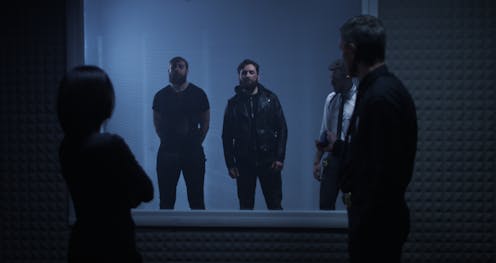Think you could pick a criminal suspect out of a lineup? If they’ve shaved or changed their clothes, you’d probably fail
- Written by Dominic T. Jordan, Sessional Academic, Edith Cowan University

Many of us would like to think if we saw a stranger committing a crime, we’d be able to identify them later in a lineup. Even if it was only a fleeting glimpse, a haircut or a different outfit wouldn’t stop us recognising them again shortly after. Surely we’d remember their facial structure, or eyes or any distinctive marks?
Our research[1] indicates probably not. Even subtle changes in appearance that can occur in a matter of days can make identifications incredibly difficult.
Having eyewitnesses accurately identify people suspected of crimes is a crucial part of police investigations. But as studies have repeatedly shown, it’s a fallible process that can result in wrongful convictions.
Here’s what we found about how even the slightest changes to someone’s appearance alter our ability to recognise a face, and why it’s so significant.
Read more: How mistaken identity can lead to wrongful convictions[2]
Hazy memories, wrongful convictions
In a criminal trial, the most compelling evidence[3] is often the identification of a suspect by a witness to a crime.
Unfortunately, research has shown eyewitness identifications are often mistaken, resulting in the imprisonment of many innocent people. In the United States, evidence collected by the Innocence Project[4] suggests identification errors contributed to 65% of wrongful convictions overturned by DNA evidence.
In Australia, the exact number of mistaken identifications leading to wrongful convictions is unknown[5].
However, there have been several high profile cases, like Terry Irving’s[6]. Irving spent five years in prison after being mistakenly identified by witnesses to an armed robbery. This shows identification errors can and do contribute to wrongful convictions domestically.
Appearances can be deceiving
For many years, researchers have tried to understand and identify factors[7] that contribute to mistaken identification.
In our study[8], 350 people were shown a photograph of a “guilty” suspect. They were then asked to identify that same person from a photographic lineup. Half of the lineups included the “guilty” suspect, the other half did not.
Photographs of lineup members were presented together (a simultaneous lineup) or one at a time (a sequential lineup). In some lineups, the “guilty” suspect had slightly shorter hair, their stubble was gone, and they were wearing different clothes.
While many criminals, such as bank robber Conrad Zdzierak[9], go to great lengths to avoid being recognised, this sort of effort may be unnecessary. We found participants were 50% less likely to correctly identify the “guilty” suspect when appearance changed in just a small way.
Participants who were 100% confident in the accuracy of their decision were also much more likely to mistakenly identify an “innocent” suspect, whom they had never seen before, when appearance changed than when it had not. Regardless of their accuracy, identifications made with high confidence are extremely persuasive[10] in court.
Police have direct control over how the lineups are conducted. Alarmingly, we found the method used to present lineups and the position of the suspect in the lineup did not improve the accuracy of identification when the suspect’s appearance had been altered.
Collectively, our findings suggest when perpetrator appearance changes in the delay between a criminal event and police lineup, witnesses may mistake them for different people. Even changes that occur naturally, easily and often appear to lead to large declines in identification accuracy.
Based on this, eyewitness researchers and policymakers may have greatly overestimated the capabilities of eyewitnesses in making identifications from lineups in the real world.
Where to from here?
Several exciting innovations in the field of police lineups have emerged in the last decade that (in theory) might better reflect the limited recognition capabilities of eyewitnesses.
For example, a range of experimental lineups have recently been developed that do not require witnesses to make a categorical (yes/no) identification. These new procedures frame recognition as similarity[11] or matching[12] tasks, where witnesses rate how closely lineup members resemble their memory of a perpetrator.
Although such procedures are not yet recommended for investigative and legal purposes, they might represent the future of police lineups[13] and may help to reduce wrongful convictions[14] associated with mistaken identifications.
Read more: Kathleen Folbigg pardon shows Australia needs a dedicated body to investigate wrongful convictions[15]
References
- ^ Our research (www.tandfonline.com)
- ^ How mistaken identity can lead to wrongful convictions (theconversation.com)
- ^ compelling evidence (psycnet.apa.org)
- ^ Innocence Project (innocenceproject.org)
- ^ unknown (search-informit-org.ezproxy.ecu.edu.au)
- ^ Terry Irving’s (www.abc.net.au)
- ^ understand and identify factors (www.apa.org)
- ^ our study (www.tandfonline.com)
- ^ Conrad Zdzierak (abcnews.go.com)
- ^ extremely persuasive (psycnet.apa.org)
- ^ similarity (ro.ecu.edu.au)
- ^ matching (psycnet.apa.org)
- ^ future of police lineups (pubmed.ncbi.nlm.nih.gov)
- ^ reduce wrongful convictions (research.gold.ac.uk)
- ^ Kathleen Folbigg pardon shows Australia needs a dedicated body to investigate wrongful convictions (theconversation.com)

















